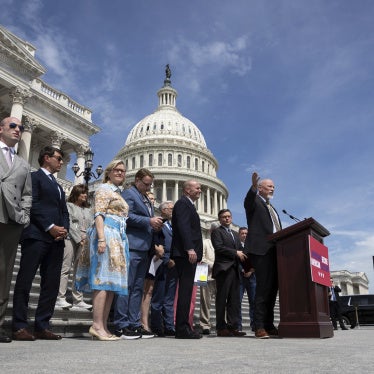The House has slipped an amendment into the Patriot Act Reauthorization Act that would dramatically skew federal death penalty cases in favor of the prosecution.
The legislation would radically increase the number of federal crimes drawing the death penalty, allow judges to reduce juries deciding the death penalty to fewer than twelve persons, and allow the prosecutor to start afresh in trying to get the death penalty with a new sentencing jury any time even one juror resists imposing the death penalty in a capital case.
Under current federal law, the defendant is given a life sentence if a jury of twelve does not unanimously vote for the death penalty. Under this legislation, the prosecutor could re-impanel a new jury and try for death once again.
“It’s a strange notion of justice indeed to give prosecutors multiple bites at the apple,” said Jamie Fellner, U.S. Director of Human Rights Watch. “Death penalty cases are already riddled with unfairness. Why would Congress want to make them worse?”
Human Rights Watch said that the legislation would give dramatic power to a single juror who could hold out for the death penalty – and thus enable the prosecution to secure a new jury. Juries in death penalty cases are already “death-qualified,” meaning that anyone who opposes the death penalty on moral, religious, or practical grounds is excluded from the jury. Yet another legislative provision passed by the House would tilt the trial in favor of death even further by permitting the judge to reduce the number of jurors below twelve, with no minimum number set. A smaller jury would make it even easier for prosecutors to secure a unanimous verdict in favor of death.
The House provisions would also triple the number of death penalty-eligible terrorism related crimes and allow the government to impose the death penalty even if the defendant had no knowledge or intent to kill. Under this legislation, an individual could be sentenced to death for providing financial support to a designated terrorist organization whose members caused the death of another, even if this individual did not know or in any way intend that the members engage in any specific acts of violence.
Rep. John Carter (R- Tex.) introduced these death penalty provisions as last minute amendments to the House version of the Patriot Act Reauthorization Act. They were passed by voice vote, without debate. The Patriot Act Reauthorization Act passed by the Senate contains none of these death penalty provisions. A final version of the legislation is expected to emerge from conference with the Senate in the next one to two weeks and go to the floor of both the House and Senate for an up or down vote.
“These provisions dramatically extend the reach of the federal death penalty and make it significantly easier for the prosecution to secure death, an inherently cruel penalty,” said Jennifer Daskal, U.S. Program Advocate at Human Rights Watch. “Such a radical change to the federal death penalty should not become law without public debate.”
The key provisions are in Title II of H.R. 3199. Section 231 (f) allows for the impaneling of consecutive juries in the penalty phase of a death penalty trial, and Sections 211 and 214 together add a long list of new federal death penalty eligible crimes that do not carry the intent requirement laid out in 18 U.S.C. § 3591(b).
The Senate version of the Patriot Act Reauthorization (S.1389) does not include these provisions.
House and Senate negotiators have begun to meet to iron out the differences in the two bills. A final version will be voted on by named conferees and then sent back to the House and Senate for an up or down vote.
Senate conferees are Jon Kyl (R-AZ), Mike DeWine (R-OH), Orrin Hatch (R-UT), Edward Kennedy (D-MA), Patrick Leahy (D-VT), Carl Levin (D-MI), Pat Roberts (R-KS), John Rockefeller (D-WV), Jeff Sessions (R-AL), Arlen Specter (R-PA).
House conferees have not yet been named.








